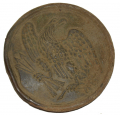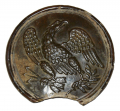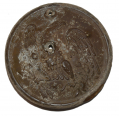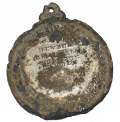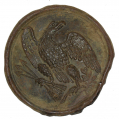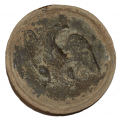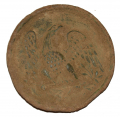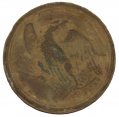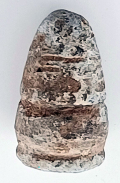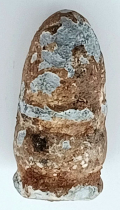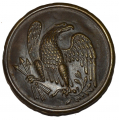site search
online catalog
Relics
Showing 251 to 300 out of 367
CONFEDERATE RICHMOND “BRANDY” SPUR
This is a classic Confederate cavalry spur and is in very good condition. Only the iron rowel is missing. The brass has a green/brown patina. There are no bends, breaks or repairs. Howard Crouch… (1184-154). Learn More »
COAT SIZE NEW YORK STATE SEAL BUTTON EXCAVATED NEAR FREDERICKSBURG, VA
Various Civil War backmarks. Most with traces of original gilt finish in recesses. [ss] [ph:L] Please do not request a specific item. ~~~~~~~~~~~~~~~~~~~~~~~~~~~~~~~~~~~ THIS ITEM, AS WITH ALL OTHER… (2023-1709). Learn More »
CUFF SIZE NEW YORK STATE BUTTON EXCAVATED NEAR FREDERICKSBURG, VA
Various Civil War backmarks. Traces of gilt finish remain. [ss] [ph:L] Please do not request a specific item. ~~~~~~~~~~~~~~~~~~~~~~~~~~~~~~~~~~~ THIS ITEM, AS WITH ALL OTHER ITEMS AVAILABLE ON OUR… (2023-1711). Learn More »
CONFEDERATE .58 CALIBER “RECUT MOLD” TEAT BASE BULLET
Excavated .58 caliber “minie ball” of Southern manufacture. Nose cast bullet with six fine grooves, a thick skirt with off-center cavity. There are mold seams visible up the sides and there is… (2022-2590). Learn More »
LEAD “BAR-SHOT” OR SCABBARD TIP FROM FREDERICKSBURG
This item is most often called a “bar-shot” by bullet collectors. The general belief is that these were cast and expected to be cut apart into individual projectiles. There are indeed many older… (2022-2510). Learn More »
DUG 6th CORPS BADGE
Recovered in the greater Richmond, VA area. Brass 6th corps badge has a darkened patina. Reverse shows where attachment pin had been soldered on but is no longer present. There are also two small… (883-57). Learn More »
$395.00
Originally $425.00
US M1851 NCO SWORD BELT PLATE RECOVERED IN ORANGE, VIRGINIA
Standard regulation M1851 NCO sword belt plate measuring 50mm by 83mm with a three-piece applied wreath and integral tongue. The left side of the wreath has broken off but the rest remains firmly… (1184-129). Learn More »
US MODEL 1816 SOCKET BAYONET RECOVERED AT FREDERICKSBURG
Bayonet is full length but is rusted throughout. Bayonet appears to have been painted black once to slow down the rust but that is now chipping off in areas. [ad]… (2022-1316). Learn More »
CONFEDERATE "RICHMOND" SPUR VARIANT
This is a variation of the classic "Richmond" style Confederate cavalry spur and is in good condition. The iron rowel is missing. The brass has an even green patina with some traces of the Orange… (1184-158). Learn More »
NICE .69 CALIBER “HIGH BASE” FRENCH TRIANGLE BASE BULLET
This scarce bullet is in dropped condition with a light gray/tan patina. This is the tall variant of the .69 caliber French bullets. Flat nose, single wide groove, and triangular cavity. In very fine,… (2022-2527). Learn More »
CRUDE .54 CALIBER CONFEDERATE BULLETS – NOSE CAST
These three-groove minie balls would have been for the .54 caliber Mississippi rifle or .55 caliber Austrian Lorenz. This style bullet features a smooth body, three fine grooves, is nose cast, and has… (2022-2672). Learn More »
.52 SHARPS BULLET FROM COLUMBIA, SC (PALMETTO SHARPS)
This is one of the Sharps bullets recovered from the Congaree River which runs past the site of the State Arsenal in Columbia, SC. The condition is very good. The patina is dark gray as were all from… (2022-2538). Learn More »
TRIPLE DEADEYE FROM FARRAGUT’S FLAGSHIP USS HARTFORD
This 8-inch iron-bound wood deadeye, used in pairs to tighten ship shroud lines, is in very good condition and comes with a 1975 notarized letter from the collector who obtained if 1957 when the USS… (1196-13). Learn More »
RELIC VIRGINIA MANUFACTORY BAYONET
Bayonet is complete with a full-length triangular blade and mortised socket. Both are encrusted with a thin layer of rust. The blade face is wide with no visible fuller. Socket meas. approx. 3 3/16 of… (490-3270). Learn More »
RELIC MODEL 1851 CADET BAYONET
Bayonet is complete with a full-length triangular blade, socket and frozen locking ring. All are encrusted with a thin layer of rust. No markings are visible. The Cadet musket was authorized in 1851,… (490-3223). Learn More »
MAINE VOLUNTEER MILITIA CARTRIDGE BOX PLATE FROM CASTLEMAN’S FERRY
This is a nice chocolate brown color excavated VMM box plate found at Castleman’s Ferry, Virginia. This is on the Shenandoah River and was the scene of the Battle of Cool Spring in 1864, but was the… (766-1541). Learn More »
$1,250.00
Originally $1,450.00
RARE .36 CALIBER “DOUBLE-END” BULLET FOR THE VANDENBERG VOLLEY GUN
The Vandenberg volley gun was the invention of a former New York militia officer, General Origen Vandenburg. Based on the French Mitrailleuse weapons design of the 1850s, the Vandenburgh consisted of… (2022-2613). Learn More »
MAINE “VMM” CARTRIDGE BOX PLATE
These plates for wear on the flaps of the cartridge box followed the standard U.S. 1839 version, but with VMM, instead of U.S., stamped in the rolled brass for “Volunteer Militia of Maine.” These… (1156-33). Learn More »
DROPPED US .58 CAL. SWAG BASE MINIE BALL RECOVERED AT GETTYSBURG BY JOHN CULLISON
This item was recovered by local Gettysburg resident John Cullison, who excavated relics on the field from 1935-1959. Cullison sold his collection to the famed Rosensteel family of Gettysburg, who… (R17319). Learn More »
FIRED US .69 CAL. ROUND BALL RECOVERED AT GETTYSBURG BY JOHN CULLISON
This item was recovered by local Gettysburg resident John Cullison, who excavated relics on the field from 1935-1959. Cullison sold his collection to the famed Rosensteel family of Gettysburg, who… (R17318). Learn More »
RARE SQUARE-SHANK WILLIAMS BULLET FOR UNION REPEATING GUN (AGAR, COFFEE MILL)
.58 caliber, Union Repeating Gun bullet, early pattern with two deep “V” shaped grooves and square pin. Smooth tan patina. Two large dings on one side, still weaving a good displayable side.… (2022-2551). Learn More »
POSSIBLE RICHMOND MANUFACTURED BAYONET FOR THE LORENZ
Bayonet is complete with a full-length triangular blade, socket and frozen locking ring. All are encrusted with a thin layer of rust. No markings are visible. The socket is thin and crudely made. The… (490-3226). Learn More »
.69 CALIBER PRESSED AND TURNED “NO-RING PRUSSIAN” BULLET
Offered here is a very nice example of a Northern, arsenal-made bullet. This style of bullet was machine pressed to form the nose and cavity, then turned on a lathe to finish the shoulder and grooves.… (2022-2627). Learn More »
.58 CALIBER MINIE BALL WITH CASTING FLAW
Here is a “dug” three-groove minie ball with a slight extension from the cavity. This flaw is likely caused by the base plug not being properly seated in the mold. This casting error has made for… (2022-2518). Learn More »
RARE .58 CALIBER “RALEIGH” BULLET
Here is an example of the rarest size of the Confederate Raleigh pattern bullet. With typical raised bands and pointy nose, but in .58 caliber. Manufactured at the North Carolina Institute for the… (2022-2624). Learn More »
RARE .58 CALIBER GARDINER EXPLOSIVE BULLET
Samuel Gardiner received patent #40,468 on November 23, 1863 for his exploding bullet or “musket shell.” These are .58 caliber 3-groove bullets for rifle muskets but with several distinctive… (2022-2643). Learn More »
CONFEDERATE CAST .577 CALIBER ENFIELD BULLET WITH TEAT
For the Enfield P-1853 rifle, but also used in the .58 caliber Springfield rifle musket. This specimen is a .577 caliber Enfield, cast in the South, teat base. Nice patina. [jet]… (2022-2561). Learn More »
.577 CALIBER ENFIELD BULLET WITH [6-SPOKE/RIMLESS WHEEL]
For the Enfield P-1853 rifle, but also used in the .58 caliber Springfield rifle musket. Enfield bullets made in England were machine pressed. A punch that formed the cavity was often engraved and… (2022-2557). Learn More »
DROPPED US .69 CAL. MINIE BALL RECOVERED AT GETTYSBURG BY JOHN CULLISON
This item was recovered by local Gettysburg resident John Cullison, who excavated relics on the field from 1935-1959. Cullison sold his collection to the famed Rosensteel family of Gettysburg, who… (R17317). Learn More »
PULLED US .58 CAL. MINIE BALL RECOVERED AT GETTYSBURG BY JOHN CULLISON
This item was recovered by local Gettysburg resident John Cullison, who excavated relics on the field from 1935-1959. Cullison sold his collection to the famed Rosensteel family of Gettysburg, who… (R17311). Learn More »
PATTERN 1826 EAGLE BREAST PLATE RECOVERED AT FREDERICKSBURG
Plate is in solid condition. There are no visible cracks or chips. The edge is complete with no missing brass however one side is pushed in a bit causing the plate to be out of round. Eagle is… (2022-1425). Learn More »
DUG PATTERN 1826 EAGLE BREAST PLATE
Face has a wonderful dark patina throughout. Detail to the eagle is very good however the plate has a small piece of missing material at bottom center. Reverse has 100% of the lead fill with a nice… (595-1901). Learn More »
DUG PATTERN 1826 EAGLE BREAST PLATE WITH BAYONET MARKS
Face has a dark patina throughout with small light patches of discoloration. Detail to the eagle is good. Reverse has 100% of the lead fill with a nice smooth finish. Only one of the hooks are… (595-1903). Learn More »
EXCAVATED CIVIL WAR ID DISK – BATTLE HONORS BUT NO NAME
Pewter “WAR OF 1861” style identification disk. In “dug” condition showing expected small chipping and edge wear. Much of the plating remains on the front and back faces. The side that would… (2022-2442). Learn More »
SKIN ONLY OF A US PATTERN 1826 EAGLE BREAST PLATE
Skin is in good condition with no cracks or missing material. Nice patina to the face and good detail to the eagle. One edge is slightly pushed causing the plate to be out of round a bit. Reverse has… (1184-97). Learn More »
DUG PATTERN 1826 EAGLE BREAST PLATE
Face is in nice condition and free of cracks and chips. Detail to the eagle is good however some of it is subdued due to the contrasting light and dark surface patina. Reverse has 100% of the lead and… (565-1902). Learn More »
PATTERN 1826 EAGLE BREAST PLATE RECOVERED AT FREDERICKSBURG
Plate is in solid condition. There are no visible cracks or chips. The edge is complete with no missing brass. Eagle is slightly subdued by the brown dirt patina which has filled in some of the lower… (2022-1428). Learn More »
PATTERN 1826 EAGLE BREAST PLATE RECOVERED AT FREDERICKSBURG
Plate is in solid condition. There are no visible cracks or chips. The edge is complete with no missing brass. Eagle is slightly subdued by the brown dirt patina which has filled in some of the lower… (2022-1426). Learn More »
$175.00
SOLD
RELIC PATTERN 1853 ENFIELD BAYONET
Bayonet is complete with a full-length triangular blade, socket and frozen locking ring. All are encrusted with a thin layer of rust. No markings are visible. Location of recovery is not known. … (490-3225). Learn More »
RELIC MODEL 1816 SOCKET BAYONET - POSSIBLE CS
Bayonet is complete with a full-length triangular blade and socket with mortise. All is encrusted with a thin layer of rust. No markings are visible. Half-way down the length of one of the blades… (490-3272). Learn More »
RARE “DUG” RELOADABLE IRON CHAMBER FOR AGAR/UNION REPEATING GUN
Offered here is an iron tube that was used in the .58 caliber, Union Repeating Gun (aka Coffee Mill gun, Agar). Paper cartridges were loaded into these reusable iron chambers. The chamber features… (2022-2815). Learn More »
RARE 90-BORE (~.36 CALIBER) BULLET FOR CHRISTIAN SHARPS PISTOL
This is the scarce bullet for the Christian Sharps pistols manufactured between 1857-1858. Solid bullet, raised bands, tie ring, nipped sprue on base. This pattern of bullet, with extended ring,… (2022-2612B). Learn More »
RARE 90-BORE (~.36 CALIBER) BULLET FOR CHRISTIAN SHARPS PISTOL
This is the scarce bullet for the Christian Sharps pistols manufactured between 1857-1858. Solid bullet, raised bands, tie ring, nipped sprue on base. This pattern of bullet, with extended ring,… (2022-2612A). Learn More »
CONFEDERATE .36 CALIBER COLT REVOLVER BULLET – 3RD PATTERN, RICHMOND LABORATORY
.36 caliber bullet for Colt and other “Navy” revolvers. This is the later-war, enlarged, 3rd pattern bullet made at the Richmond Laboratory. This bullet has a more-bulbous nose, solid base and one… (2022-2506). Learn More »
FIRED .52 CAL. SPENCER BULLET RECOVERED AT GETTYSBURG BY JOHN CULLISON
This item was recovered by local Gettysburg resident John Cullison, who excavated relics on the field from 1935-1959. Cullison sold his collection to the famed Rosensteel family of Gettysburg, who… (R17340). Learn More »
MAINE “VMM” CARTRIDGE BOX PLATE FROM ORANGE, VIRGINIA
These plates, measuring 56 X 87mm, followed the standard U.S. 1839 version, but with VMM stamped in the rolled brass indicating Volunteer Militia of Maine. These were paired on equipment with the… (1184-148). Learn More »
CIVIL WAR NCO ROUND EAGLE SHOULDER BELT PLATE
These plates were introduced in 1826 for use on the bayonet shoulder belt. When the bayonet was switched to wear on the waistbelt in the early 1840s these plates with hooks were relegated to use on… (1184-136). Learn More »
EARLY RELIC FIRE STRIKERS (A.K.A. STRIKE-A-LIGHTS)
Offered here are a variety of steel fire strikers; the “steel” part of “flint and steel.” A fire striker is a piece of carbon steel from which sparks are struck by the sharp edge… (160-93). Learn More »
FIRED .577 ENFIELD BULLETS RECOVERED AT GETTYSBURG BY JOHN CULLISON
This item was recovered by local Gettysburg resident John Cullison, who excavated relics on the field from 1935-1959. Cullison sold his collection to the famed Rosensteel family of Gettysburg, who… (R17332). Learn More »
DROPPED .54 CAL. MINIE BALLS RECOVERED AT GETTYSBURG BY JOHN CULLISON
This item was recovered by local Gettysburg resident John Cullison, who excavated relics on the field from 1935-1959. Cullison sold his collection to the famed Rosensteel family of Gettysburg, who… (R17331). Learn More »
Showing 251 to 300 out of 367
Most Popular
Historical Firearms Stolen From The National Civil War Museum In Harrisburg, Pa »
Theft From Gravesite Of Gen. John Reynolds »
Selection Of Unframed Prints By Don Troiani »
Fine Condition Brass Infantry Bugle Insignia »
British Imported, Confederate Used Bayonet »
Scarce New Model 1865 Sharps Still In Percussion Near Factory New »
featured item
CONFEDERATE CAVALRY SABER BY FROELICH
This is a very early and possibly unique Confederate cavalry saber, possibly even a cavalry officer’s saber, by Louis Froelich. It uses a crudely cast, heavy, thick guard, with the side branches branching off from the knucklebow at two different… (870-614). Learn More »
site search
Upcoming Events
May 16 - 18: N-SSA Spring Nationals, Fort Shenandoah, Winchester, VA Learn More »




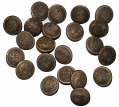







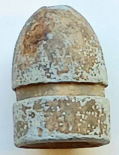

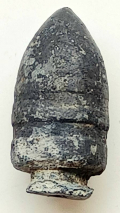
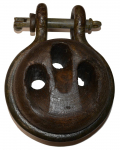



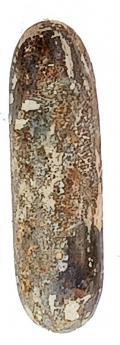



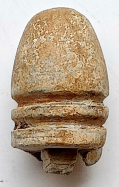

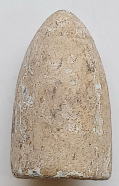
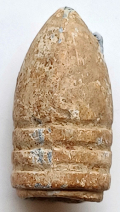
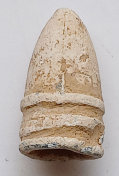

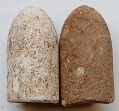
![.577 CALIBER ENFIELD BULLET WITH [6-SPOKE/RIMLESS WHEEL]](/images/product/43/186013_tn.jpg)


